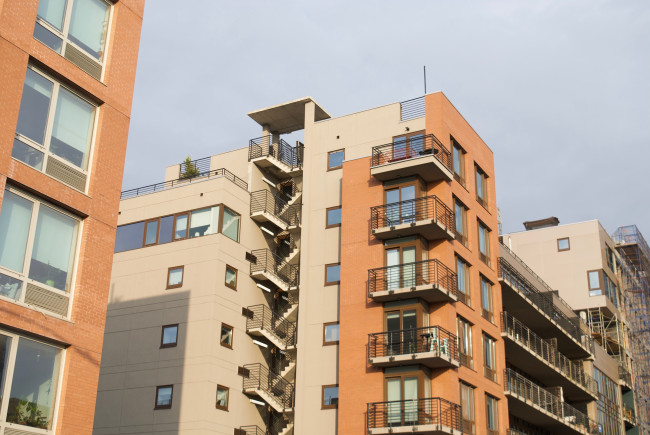2020 NYC real estate forecast: Buyers trade up, renters lose advantage, and sellers...quit?

The condo glut has had an impact on all kinds of apartments, giving buyers the muscle to trade up, for example, to a high-end co-op building that has spruced up or relaxed some restrictions in order to stay competitive with new condos.
You could say lightning struck twice in the New York City real estate market in 2019: First in the form of New York’s historic rent reforms and again with a pile up of luxury condos. As a result, power shifted in two significant ways: from landlords to tenants, and from sellers to buyers.
You may be wondering if this is the new normal—or if these trends will reverse.
Brick Underground breaks down what you need to know in order to achieve your real estate goals for 2020—whether it’s buying, selling, or renting a new place. Our 2020 forecast is divided into corresponding sections, so if you’re short on time, go ahead and skip to the section that is relevant to you.
- 2020 real estate forecast for NYC renters
- 2020 real estate forecast for NYC buyers
- 2020 real estate forecast for NYC sellers
But you should also keep in mind that New York City buyers, sellers, and yes, renters, now are more interdependent than ever before. And so we recommend reading the entire forecast in order to better understand how real estate works here, and how a shift in one area ripples through the entire system.
For what you as a renter, buyer, or seller in NYC can expect in the months ahead, read on.
What to expect if you're a renter
If you’re a renter, you’re probably thrilled with the new change in the power dynamic, thanks to the Housing Stability and Tenant Protection Act passed in June last year. These landmark changes to the state’s rent laws shifted the ground beneath landlords, giving both rent-stabilized and market-rate renters new protections, including a ban on asking potential tenants for “last month’s rent” on top of a security deposit.
Predictably, landlords say the new laws go too far. They are looking to roll back some of the legislation arguing they can’t make enough to maintain their buildings—despite seeing record-high rents.
No sign of NYC rents dropping in 2020
And you can count on NYC rents to continue to rise in 2020 because there’s so much competition for apartments, and you can blame the poor sales market for that. Through most of 2019, would-be buyers were “camping out” in the rental market, says Jonathan Miller, president and CEO of appraisal firm Miller Samuel.
Barring a correction in the sales market that encourages buyers to get off the sidelines, these trends will likely continue. The crowded rental market also means landlords won’t face much pressure to fill apartments, and so getting a lease with some kind of concession will be harder to find in 2020. You’ll be increasingly less likely to get a lease with free months, owner-paid broker fees, or other freebies to attract new tenants.
If you’re a market-rate tenant, there’s not much you can do about rising rents. In fact, you may even be collateral damage, because with new rent laws preventing landlords from increasing rents on their stabilized tenants, there are signs that landlords are raising the rent on their market-rate tenants to make money where they can, says attorney Sam Himmelstein of Himmelstein, McConnell, Gribben, Donoghue & Joseph (a Brick Underground sponsor).
Your choices as a market-rate tenant boil down to two options: You can try to negotiate with your landlord, or you can move, says Himmelstein.
(For the lucky few, there’s a third option as well: You can look at the rental history of the apartment to challenge your non-stabilized status and find out if you are in fact stabilized. Changes to the rent laws make it easier for market-rate tenants to challenge their status.)
In case you’re wondering whether rising rents will prompt more New Yorkers to vote with their feet, and move out of the city, it may be happening already: For the first time since 2010, NYC’s growth slowed in 2018—losing a net 40,000 people, according to the Census Bureau (although the de Blasio administration disputes the numbers). And the rise of trendy axe-throwing bars in NYC suburbs suggests there are efforts ahead to lure millennials out of the city.
Co-living options will continue to grow
One beneficiary of NYC’s high rents: Co-living companies. Part of the sharing economy, co-living strives to make renting hassle-free, especially with roommates, offering far more flexible terms and lower upfront fees (there are no broker fees) than traditional rentals. With millennials increasingly convinced they will never afford to buy in the New York metro area, and vast annual inflow of college and grad-school grads, it makes sense that the co-housing model will continue to expand its market share.
It’s not all upsides for co-living renters, however. The relatively new housing model has many variations and some co-living companies don’t follow the laws. (Tenants at the co-living company Bedly found this out the hard way.) Tighter regulation of these companies is unlikely as tenant activists direct their energies elsewhere. If you take this housing route, make sure you research the company, check the reviews, trust your instincts, and most importantly read the paperwork: All roommates need to be on the same lease or you could find yourself being thrown out of the apartment by city inspectors.
New threats to rent-stabilized tenants and apartments
Last year’s landmark rent reforms will continue to reverberate through New York City’s rent-regulation ecosystem—not always to the benefit of tenants.
Landlords of rent-stabilized apartments will do whatever they can to push back against the new laws that limit their ability to increase rents. A group of landlords has filed a lawsuit against the new laws arguing they violate their rights and are an unconstitutional ‘taking’ of property.
Meanwhile, tenant advocates like Mike McKee of Tenants PAC predict landlords will continue to warehouse apartments, and combine or chop them up, in an effort to skirt the laws. Combining two stabilized apartments is one way landlords can get a one-time rent hike from a new tenant.
Eric Hamm, senior managing director at Citi Habitats, anticipates a shortage of renovated apartments that are affordable. A Wall Street Journal article bears this out, reporting NYC landlords cut renovation projects in buildings with rent-regulated apartments by 44 percent, or 535 fewer jobs, in the five months after the new rent laws went into effect.
“There’s no upside for landlords to put money into rent-stabilized units. So whereas we started to see dishwashers and washer dryers, stainless steel appliances and quartz countertops at the lower price points in upper Manhattan—that’s done,” Hamm says.
Elizabeth Stone, the managing agent at Stone Realty Management, says she will not be renovating rent-stabilized apartments and predicts “the market for used appliances is going to skyrocket” as landlords look to cut corners instead of buying new.
The legislative session of 2020 will pit tenant activists against landlords again on some “big remaining issues that were not addressed in the 2019 bill, including re-regulation of some 300,000 to 450,000 deregulated apartments,” says McKee, referring to rentals that have already cycled out of the rent-stabilization program, which activists want reinstated as affordable apartments.
It’s also possible there will be another push for a good cause eviction bill, something that didn’t get approved last year. The outcome is uncertain, says McKee, and it’s even possible tenants might lose some of the gains won in 2019.
What to expect if you're a buyer
If you were thinking about buying in 2019, you may have put your search on pause—for a long list of reasons: The new cap on state and local tax deductions, a new hike for the mansion tax, recessionary jitters, the inability to sell your current home at the “right” price (or at all), and a conviction (or at least a wait-and-see attitude) that prices may fall further.
But there is also a long list of reasons—such as trading up—why you may feel more comfortable buying (sometime) in the year to come—even if it takes a while to get to that point. Favorable conditions—namely falling prices—will draw some buyers back, but industry insiders predict that buyers will not be rushing into the market right away.
Prices for condos continue to dip—co-ops may fall further too
The volume of sales has been dropping for about two years in NYC, and in the third quarter of 2019 the falling number of sales finally dragged down prices for co-ops (condo prices have been dropping for nearly two years.) Mortgage rates remain unusually low (30-year fixed-rate mortgage rates averaged just 3.9 percent during 2019, the fourth-lowest annual average level since 1971, according to Freddie Mac) and the number of apartments available for sale is historically high, especially for high-end condos, where developers are offering extreme incentives in order to close sales. These trends are likely to continue to hold for 2020. One of the biggest wild cards? Politics, including this year’s election.
Pierre E. Debbas, managing partner at the law firm Romer Debbas, predicts a slow but gradual increase in demand for apartments in 2020. “There are too many positive economic factors that should be driving demand in the market. Given it is an election year and consumers still feel there is further room for pricing to correct itself, I do not think we will see a spark in the sense of urgency from buyers until 2021,” he says.
Lisa Lippman, a broker at Brown Harris Stevens, says in order to return to the market, “buyers are going to need to see that prices have stabilized, which I believe they have…I don’t see prices going up so quickly.”
‘Good listings’ may be taken off the market
But there is only so low a seller will cut their prices before, in effect, taking their ball and going home. What that means for buyers in 2020, according to Jonathan Miller, is that “we might be getting to a point where the good stuff is taken off the market.”
Shelly Place, an agent at Triplemint (a Brick Underground partner), echoes that theory, saying sellers often have the option to rent out their apartment and that creates “a reduction in the good inventory.” It’s a reminder that as prices come down, there may be fewer apartments on the market, limiting your options.
Triplemint's Off-Market Advantage
Discover off-market properties in your dream neighborhood that perfectly suit your needs and budget. Meet and deal with sellers before their apartment hits the market.


Let Triplemint's off-market team give you exclusive access to apartments in your price range and desired neighborhood that no one else has seen. More options, less competition, no bidding wars.
There will, however, be opportunities for budget-conscious buyers if you keep an open mind. For example, it’s no longer a sign that something is wrong with a listing if it’s been through multiple price cuts. Keep your eye on apartments that have been on the market for a while and have price reductions, advises Lippman.
Mortgage rates remain at historic lows in 2020
In 2019, the Fed continued to reduce interest rates to boost the economy and the stock market, which in turn benefited the housing market. As a result of three rate cuts, mortgage rates saw record lows in the 3-plus percent range. In December, the Federal Reserve left rates unchanged and signaled they would be on hold through 2020.
According to Brittney Baldwin, vice president of National Cooperative Bank (a Brick Underground sponsor) the reports and surveys she's seen for 2020 predict rates will remain low and be similar to 2019.
“I anticipate mortgage rates remaining low for 2020. I see no economic indicators to think otherwise,” says Michael J. Romer, managing partner at the law firm of Romer Debbas.
Where to find deals and trade up
Thanks to those historically low mortgage rates, and record highs for the stock market, all-cash luxury buyers essentially disappeared in 2019—it simply made more sense to finance. So if you need a mortgage to buy a place in 2020, you probably won’t suffer a competitive or negotiating disadvantage by not being an all-cash buyer. And with NYC prices trending down, you’ll be able to maximize your purchasing power through financing.
If you’re in the market for a new condo, you are in a prime position to take advantage of NYC’s condo glut. Check out buildings that went up about two years ago and have only a handful of units left to sell—developers are offering all kinds of extreme incentives and cutting prices on the very last units. Negotiability on transfer tax, mansion tax, and other closing costs are a given.
In fact, the new condo glut has had an impact on all kinds of apartments, which gives buyers the muscle to trade up, for example to a high-end co-op building that has spruced up or relaxed some restrictions in order to stay competitive with new condos. And if you’re buying a co-op, don’t assume deal sweeteners are reserved for condo buyers alone—discounts can be negotiated through closing costs, taxes, and attorney fees.
What to expect if you are a seller
There’s no gentle way to say this: Selling for more than what your neighbors sold for just a year (or even just six months ago) is officially a fantasy.
The numbers don’t lie. Prices for co-ops and condos took a hit in 2019. As of the third quarter, the median sales price for condos has declined seven times in eight quarters, and NYC saw the first annual decline in co-op median sales price in 13 quarters. Many owners who bought in the last five to six years would lose money if they sold today, a situation that persists from 2018.
Unsure what your apartment is worth in a buyers' market? Before you list your place publicly, test your price quietly among real-life, qualified buyers via the pre-marketing program at New York City real estate brokerage Triplemint. There's no charge to participate, nor any obligation to enter a traditional listing agreement if your place doesn't sell during the pre-marketing period. Click here for more information.
Sellers need to make their listings stand out
The forces that flipped New York City into a buyer’s market last year—sluggish sales, an oversupply of luxury condos, and consumer uncertainty—will remain in effect in 2020. But that doesn’t mean selling is always a losing proposition.
A good reason to sell in this market would be if you are trading up—you’ll maximize your spending power if you buy again quickly within the same market cycle, and the oversupply of luxury condos means the market is weaker the higher you go, so your negotiating power increases as you look for something larger and more expensive.
Prices are dropping on a deal-by-deal basis, and in Miller’s words, NYC may be getting to the point where sellers, who are sick of making those price cuts, will yank their listings off the market. When that happens, “all we are left with is not-so-good product,” he says.
This could be an opportunity for sellers who can stick it out and have their apartment be the diamond among the coal. That may mean renovating your apartment with the goal of selling it—buyers who don’t want to undertake a renovation themselves will pay a premium for an updated apartment.
Don’t expect perfect timing
“If you need to sell, sell now,” says Brandon Marianne Lee, an agent with Triplemint. She anticipates the same uncertainties that plagued the market last year to underpin this year’s market, with the added drama of an election year, so “it could be two or three years before you'll start getting confident buyers. If you can wait another five years, then do that. If you can't, sooner is way better than later.”
Keep in mind that in a slow market, comparative sales (comps) lag what’s going on today, which can make pricing more complicated.
Be prepared to offer a deal
Sellers would be wise to take a page from the playbook of new condo developers—who in an effort to avoid cutting prices are getting increasingly creative in order to strike deals and offering to pay common charges, taxes, or attorney fees.
Essentially, sellers have no choice but to compromise: Buyers know that almost everything is up for negotiation and expect freebies to be thrown into their deal.
Co-ops need to be competitive with condos
Co-ops are typically older than condos and have lost—or barely participated in—the amenity competition in the NYC condo market. Co-ops traditionally have asked buyers to jump through strict financial and administrative hoops to become shareholders but have always had the competitive advantage of being cheaper per square foot than condos.
However, as condo prices fall, co-ops need to wise up to the competition. Buildings with overly strict admission requirements and very high thresholds for asking prices will get a wake-up call, if they haven’t already. Liberalizing their rules, for example about renovations and pieds à terre, modernizing common areas and adding amenities—in effect condo-izing a co-op, will allow older co-ops to compete.
So if you are a co-op owner, you can try to push your board to make improvements, speak up about lobby, hallway and rooftop renovations, and make sure the building is in good financial shape.
Where you may run into some cultural resistance is pricing. Co-op boards get to approve a sale and don’t want the average share price of units to take a hit—something that’s possible in a down market. In some cases, the board will insist on a particular price or they won’t approve the sale. If that’s your situation, you need to make sure your board’s grasp of the market is realistic. You would be smart to do some research, talk to a broker (or several) and arm yourself with an appraisal.
“It is incredible that there is a belief that prices can be controlled,” says Miller, pointing the finger at co-ops. He says the exclusivity of having a tough board that “irrationally” turns down buyers is actually “damaging” to the building. A savvy co-op board will be “more pragmatic about actual market conditions,” he says.
You Might Also Like





























